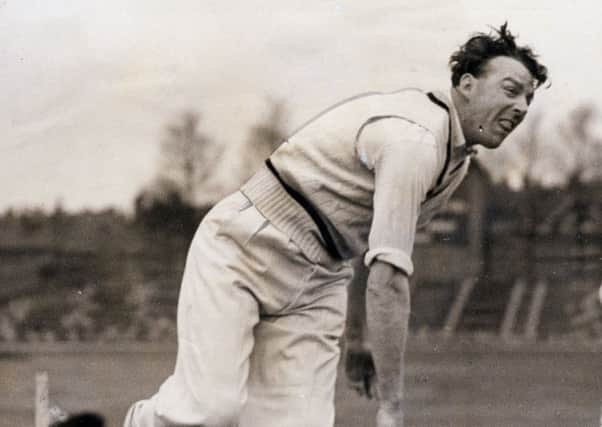Innings closed on a joyful second career covering Yorkshire cricket


Since his first self-published book in 1997, to his final one now entitled Through The Remembered Gate, Chalke has written about many of the county’s esteemed cricketing figures including, most notably, the former Yorkshire and England seam and spin bowler Bob Appleyard.
Now Chalke, having entered the eighth decade of a varied life, is bringing down the curtain on Fairfield Books, the cricketing publishing house that he has run from home and which has produced 42 volumes written either by himself or other leading writers such as the incomparable David Foot.
Advertisement
Hide AdAdvertisement
Hide AdIt is a sad day for cricket indeed, for there has been no greater champion of its history and heritage than Chalke, who has talked with and written about so many players of the 1950s and 1960s especially, before turning their words into a distinctive and conversational approach to authorship that is very much his own.
Chalke’s collection of such memories, and of the books that he has written and published, form the basis of Through The Remembered Gate, an exquisite memoir that also betrays his gratitude for having had the opportunity to do so.
As Chalke did not become a cricket writer until his late 40s, and has not been weighed down by the time-consuming demands of newspaper work, he has perhaps retained an energy/interest which cricket writers already that age may have lost, and there is surely nothing more exciting than the pursuit of a “second career” – particularly if it doubles as a hobby/labour of love.
Certainly no cricket author has better captured the voices of the cricketers with whom he has collaborated, for, like the Appleyard book, and also one more recently with another former Yorkshire and England spin bowler, Geoff Cope, they are very much collaborations in which the “voice” is everything.
Advertisement
Hide AdAdvertisement
Hide AdIndeed, if I flick through the Appleyard book now, I can still hear Bob’s voice even though he left us in 2015 in his 91st year, a man who retained so much energy and zest for life in his old age that it was as if he was powered by the National Grid.
For that book alone, a worthy recipient of the Wisden Book of the Year, Chalke’s status as one of our finest sportswriters is assured, a book which – considering Appleyard’s tragic backstory – also showed that the best books about sport are rarely just about sport.
Appleyard’s life was touched by devastating tragedy and illness; if you have not read the book, you are not educated in Yorkshire’s cricket history until you have done so.
Chalke has won several awards and rightly so; indeed, his work carries great authenticity unlike that of some authors for whom authenticity/the actual subject are clearly secondary to their own desire to be classed as great writers.
Advertisement
Hide AdAdvertisement
Hide AdBut authenticity is everything – what is an author without it? – and with Chalke you always get the sense that the story is the most important thing to him as opposed to his own advancement/reputation, which nevertheless follows because of that fact.
Chalke’s contribution to Yorkshire history is evident in so many of his books – including a couple of my own favourites, the slim volumes on Percy Holmes and Herbert Sutcliffe’s then world record stand of 555 at Leyton in 1932 and George Hirst’s “summer of plenty” in 1906.
So many cricket books are horribly long-winded affairs, crammed with innumerable statistics and seemingly intent on using every item of research that the author has ever carried out – a common trap.
But those two volumes are examples of how to take particular events in cricket history and to capture them in perfectly described, appropriately condensed detail.
Advertisement
Hide AdAdvertisement
Hide AdIt helps that Chalke has a natural affinity with cricket’s traditions and that of the County Championship; his splendid Summer’s Crown, in fact, is the story of that glorious tournament.
And although his books are self-published, what they lack in commercial reach they more than make up for in quality of production.
Indeed, when I was writing a book myself a few years back on Hedley Verity’s world record 10 for 10, I approached Chalke as a potential publisher as I knew that he would have a natural affinity with the subject and would produce it so well, with every possible skill and attention to detail.
I could hardly complain at Bloomsbury’s ultimate treatment of it after Chalke felt that he could not really get it into the “big shops”, as he put it, and politely declined while pursuing an already considerable workload in any event. It was a shame, for to have had a book published by the Fairfield imprint would have been nice.
Advertisement
Hide AdAdvertisement
Hide AdThat, however, is Chalke in a nutshell – a man of integrity and a small publisher who has written superbly about subjects which, to some people, may be minor/relatively insignificant compared to the “bigger” ones favoured by some larger publishers but which, to the true cricket lover, are anything but.
I return to the fact that he has brought to cricket writing a distinctive and conversational approach to authorship that is very much his own; inimitable, even.
Fairfield Books, of Bath, Somerset, may be retiring on 42 not out after a tremendous innings, but our applause and appreciation lives on.
Well played, Stephen Chalke – a great writer and custodian of the summer game.
Through The Remembered Gate by Stephen Chalke is published by Fairfield Books, priced £16.